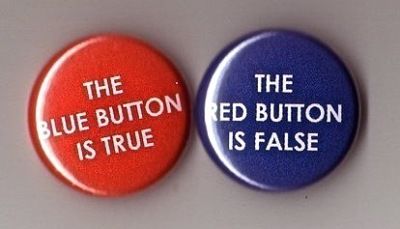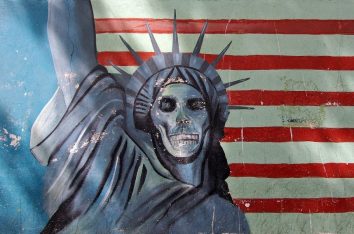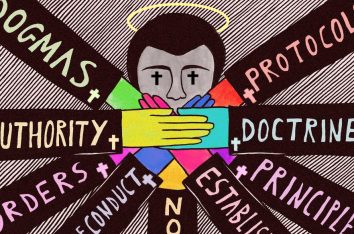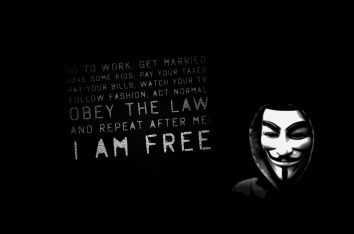 I have been thinking lately about the issue of integrated, holistic living.
I have been thinking lately about the issue of integrated, holistic living.
What I mean by this is the idea that one’s life could or should reflect a worldview that is internally consistent and all-encompassing. For example, I explained recently that I am trying to move my eating habits in a more whole-foods, vegan direction. Part of my reasoning for this has to do with the issue of complicity in an overall system that I have huge problems with — if I question certain American values, doesn’t it make sense to question the American diet? After all, eating is a political and cultural act, and how we do it says more about us than we might realize at first glance.
This brings up an interesting question: Just how many consistent worldviews are there, really?
Stick with me, now. If someone, say, places a high premium on his freedom to own an assault rifle, chances are he is suspicious of any government plot to strip him of that right. In fact, he is probably suspicious of government power of any kind (like the mandating of health care or regulation of industry, for example). This person will most likely be a free market capitalist who favors the reduction of publicly-funded aid for the poor, who thinks immigration laws should be strict and well-enforced, and who believes drilling for oil in the ANWAR is a good idea.
On the other hand, if someone shops at a farmer’s market, chances are he values guilds or unions and is mistrustful of corporations in particular and of the accumulation of wealth in general. He is likely unfavorable toward the military and the military industrial complex as a whole, and he would have marched in Seattle against the IMF and World Bank if he had had the chance. And he drives a hybrid car.
These two people seem to have diametrically opposite worldviews, even though both of them are quite internally consistent. It makes sense for the strict-immigration guy to favor Alaskan drilling, just as it makes sense for the IMF protester to eat organic food.
But what happens when one’s worldview contains elements that are directly contradictory and internally inconsistent? In one respect I am an example of this very thing, for when it comes to civil and political matters I am something of an anarchist, preferring organization from the bottom up rather than from the top down. Yet despite this, I am a member of perhaps the most hierarchically-organized institution in history: the Catholic Church.
For my part, I long for holistic integration for a variety of reasons. But in this case my worldview is just one big ol’ contradiction, and that contradiction exists in perhaps the most significant of issues.
Is this a problem that needs resolving? Must my views on spiritual matters be brought into line with my views on earthly ones (or the other way around)? Or should integration be set aside in this case? If so, why? Because heaven and earth play by different rules? If so, why? Or should the quest for integration be jettisoned for some other reason?
In a word, can this tension be ignored and allowed, or does something gotta give?




Or should spiritual views harmonize with spiritual views? That is, in this case, should a two-kingdom theology give way to an over-arching Catholic theology? I mean, do the kingdoms really get any more integrated than in the Catholic schema–it gave us a Christendom so enticing much of even Protestantism that gave us 2k still clings to it.
To thine own self be true, Saul.
Zrim,
For Catholics it comes down to the Incarnation. If the nature/grace relationship is at all affected by it, then the ripple effects are pretty profound.
I’m more curious about the issue of hierarchy, though. Is there such thing as an anarchist Catholic?
Jason,
J.R.R. Tolkien described himself as leaning towards Anarchism:
http://rodbenson.com/2011/08/20/tolkien-on-anarchism/
His political views are embodied in The Shire (which was functionally anarchist but ideologically traditionalist and monarchical–an excellent combination in my opinion) and the “little, merry England” of Farmer Giles of Ham. Hierarchy, like love, is at the heart of reality (even within the Trinity, God the Father is monarch), but it does not follow that men are particularly good at either.
The 2k view still seems best, in which case the adherent of a spiritually authoritarian arrangement (Catholicism) can also adhere to a laissez-fair provisional philosophy. The problem seems to be that when that the adherent’s spiritual view assumes that heaven implies earth, i.e. that grace perfects nature and that how the church governs herself is how the world should, then it isn’t clear how our authoritarian religionist can maintain his laissez-fair philosophy.
Not that I’m anyone to you, Jason, but I think that you mislabels yourself an anarchist, when you really are into pure democracy (i.e. not republican ideals, but true, “each of us should individually have a say at driving the boat”). In that way, its not contradictory to be Catholic and a “anarchist” as you say. Further, it seems to me that we are capable of desiring external structure in one area of our lives, but not in others. I think the attempt to apply one rule to all contexts is probably causing you to perceive you worldview as being internally inconsistent.
That said, resolving the dissonance thats going on in ones head is very important to finding the quiet mind. Anyways, just felt I had to comment. Hope it helps in some way.
Andrew,
What if it is the case that men are simply unqualified to rule over subjects without becoming tyrants? (The whole absolute power corrupts absolutely thing.) Can it simply be the case that earthly reality, due to our fallenness, cannot reflect heavenly reality in this instance?
Zrim,
I agree with you that a two-kingdoms model seems best. But if the Incarnation implies more than merely the narrow saving-of-souls issue, then holy crap, right?
Does the Son’s assumption of, then glorification of, and then ascension with human nature and human flesh directly affect anything? Does grace take nature and elevate it, perfect it, and renew it? If so, then it would seem unnatural and unhuman to cordon off earth from heaven, as though Christmas doesn’t exist.
Hi Don,
I use anarchism, libertarianism, socialism, and democracy synonymously. They all classically refer to power being concentrated in those affected by the use of that power. Which, of course, is the opposite of how the Catholic Church is governed.
What can I say, I’m a synthesizer? When something I value is not applied in some huge area, it irritates me!
I think prots can maintain the historic centrality of the incarnation. It is, after all, paparadoxical, and wonderful, for God to enter his own creation. I agree the reformation brought a focus to atonement that didn’t seem to be as prominent in early Xtianity. It’s not exactly easy to say why atonement wasn’t there as we have it so central is Protestantism today.
From what I know of 2k, it’s wonderful, and it would take a lot to get me to give it up.
Interesting discussion here. Later.
Typos…my bad.
But if heaven and earth don’t play by different rules then holy crap, because that would mean pastors could enforce law and sheriffs dole out grace. *Shudder*.
Still, while the incarnation does imply more than the saving of souls, it’s just not clear to me why that should mean one’s spiritual views need to harmonize with his civil views. Souls will unite with bodies and both will be made incorruptible, etc., but that’s a reality in the age to come. In the present age, we wait for that sort of harmony and in the meantime live with the admixtures of harmony and paradox.
Jason,
If that were the case, that is, if every appointed ruler inevitably becomes a tyrant, then anarchism in the literal sense of “no ruler” would be the default political position. But “arche” does not mean “tyrant”, and while history shows that some rulers do become tyrants, it also shows that not all rulers become tyrants.
When I spoke of hierarchy, I was thinking of “arche” as analogous and almost synonymous with “kephale” or headship. I was attempting to invoke this as a principle of being, which is why I referred to “reality”, which of course includes heaven and earth, this world and the world to come. The way we first come to appreciate this principle is of course with reference to organisms. Obviously, nature does not favor multi-headed animals. Social organisms, or organizations, tend to follow nature’s lead on this point, and when it comes to divine societies, namely (from the Christian point of view), the Trinity, ancient Israel, and the Church, the principle of headship or hierarchy is clearly upheld (monarchy of the Father; rule of Moses / David; kingship of Christ / [for Catholics] stewardship of Peter). For these reasons, I think that arche is not something contingent, but is rather something like a first principle of life and action, on the level of organisms and organizations. Even strictly democratic societies, insofar as they exist and are capable of action, must have some principle or mechanism by which they act as one.
Obviously, the Fall, or whatever one calls that which that keeps human beings from abiding together in peace and harmony, has dire effects on rule (arche, headship) as exercised in concrete communities. I don’t think that in principle this is any more the case with monarchies or aristocracies versus democracies or anarchic societies (granted that the latter is not a contradiction in terms). As Aristotle and others have noted, every form of government has its distinct mode of corruption. I cannot remember any exact taxonomy, but just as monarchy can devolve into tyranny, democracy can devolve into mob rule.
Anyway, I agree with those who have been saying that consistency does not require uniformity; in this case, it is not necessarily inconsistent for one type of rule to be the best in one sphere (or time, or place), and another type to be the best in another sphere (or time, or place). As between church and state, uniformity would go something like this: episcopal/monarchical; presbyterian/oligarchic; congregational/democratic.
Historically, we can see how things have lined up this way at various times and places (e.g., Anglicans being monarchical; conversely, its hard to imagine a congregationalists being a monarchists). But though this is understandable, I don’t see how such uniformity is necessary for consistency / integrity in one’s understanding of the nature of reality.
Here as elsewhere, concrete example are better than abstract principles. The concrete examples that fuel my thinking about politics run along biblical, classical, and medieval lines, the latter mediated through Tolkien and Lewis as much as professional historians. With the exception of the Church, all these societies are long gone, which makes them easy to romanticize. But having a “vision” of the good is at least as important of having a theory about the good, and somehow my vision includes both kingship (rule) and anarchy (freedom from control).
For clarity’s sake, I can summarize my main points as follows:
1. Hierarchy/headship is an irreducible feature of life (biological and social).
2. Every kind of political society is subject to corruption in the form of abuse of power. (I have not made any claims about which kind of society, if any, is in general more or less prone to such corruption.)
3. While intellectual integrity requires recognition of principles and acceptance of their implications, it does not require uniformity in their application; e.g., the principle of arche (rule, headship), even if in some way universal, need not apply in the same way in every instance.
Awesome issues here. I’m very happy to see your article. Thank you so much and I am having a look forward to touch you.
Will you kindly drop me a e-mail?
“I am trying to move my eating habits in a more whole-foods, vegan direction.” Of course you are, it’s trendy, you’re a hipster. Where’s your latest tattoo? And why did you get a tattoo again? Oh ya, everyone else is doing it; just like the pork pie hat, the cigars, martinis, etc.
You’re not the least bit consistent. You’ve gone from Calvary Chapel to the OPC to the RCC. What’s next? I’m guessing a stint in the Emergent club and then on to outright atheism. I’ll bet the house on it. You’re the epitome of being tossed around by every wind of doctrine. Others have predicted the same thing.
My next tattoo will either be the Chinese symbol for the word “Chinese Symbol” or an ironic mustache on my upper lip.
And yes, I became a Christian when I was 12, a Calvinist when 23, and a Catholic at 39. Better not avert your eyes, because I’m unpredictable as a spider-monkey!
Not really unpredictable just (majorly) lacking in discernment.